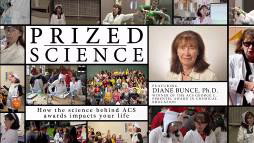FOR IMMEDIATE RELEASE | October 16, 2012
Fostering tomorrow’s scientific breakthroughs: New American Chemical Society video
WASHINGTON, Oct. 16, 2012 — A new episode in the American Chemical Society’s (ACS’) popular Prized Science video series features a virtuoso in teaching the next generation of scientists, who must discover tomorrow’s life-saving medicines and new fuels and help solve other global challenges. The videos from the world’s largest scientific society are available at www.acs.org/PrizedScience and by request on DVD.
The video, produced by the ACS, the world’s largest scientific society, is available at www.acs.org/PrizedScience and by request on DVD. Prized Science — Vicki Grassian: Making Sense of Atmospheric Dust is the newest episode in the 2012 Prized Science series, which features the science behind some of ACS’ national awards.
Media Contact
Michael Bernstein
202-872-6042
m_bernstein@acs.org
Michael Woods
202-872-6293
m_woods@acs.org
Titled Prized Science: How the Science Behind American Chemical Society Awards Impacts Your Life, the fourth episode of the 2012 series features the work of Diane Bunce, Ph.D., winner of the 2012 ACS George C. Pimentel Award in Chemical Education. Cengage Learning and ACS co-sponsor the award. Bunce is a professor at the Catholic University of America here.
Bunce’s efforts have extended beyond educating future chemists and other scientists to include students who will pursue other professions — but must have a sound grasp of science to participate as citizens in modern society.
In the video, Bunce challenges traditional notions about teaching, such as the role of lectures and the idea that students fail because they do not extend sufficient effort to learn. Bunce says that teachers need to make chemistry relevant to students. One way that she does this is by featuring “tie-ins” with foods served at holiday celebrations. For example, she explains how baking soda in muffins served at a Thanksgiving meal produces carbon dioxide while in the oven, expanding the batter so the muffins have a light and airy texture. It’s a chemical process she can easily demonstrate in a classroom and that has a big impact on her students.
The premiere 2012 episode of Prized Science featured Robert Langer, Sc.D., winner of the Priestley Medal, ACS’ highest honor. That video explains Langer’s pioneering work making body tissues in the lab by growing cells on special pieces of plastic. Langer’s team has used the approach to make skin for burn patients, for instance, with the goal of eventually making whole organs for transplantation.
Other episodes feature Chad Mirkin, Ph.D., winner of the 2012 ACS Award for Creative Invention and Vicki Grassian, Ph.D., winner of the 2012 ACS Award for Creative Advances in Environmental Science and Technology. An upcoming episode will feature Peter Wolynes, Ph.D., winner of the 2012 ACS Award in Theoretical Chemistry.
The 2012 edition of Prized Science is completely refreshed, with a new look and feel, with renowned scientists telling the story of their own research and its impact and potential impact on everyday life. Colorful graphics and
The ACS administers more than 60 national awards to honor accomplishments in chemistry and service to chemistry. The nomination process involves submission of forms, with winners selected by a committee consisting of ACS members who typically are technical experts in the nominee’s specific field of research.
To automatically receive news releases from the American Chemical Society contact newsroom@acs.org.
###


